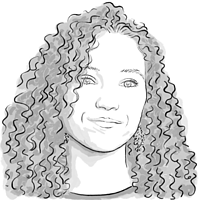Power unlocked: Debt funds conservation, refugee brings solar to his camp
Loading...
1. Belize
A vigorous model of debt restructuring is freeing up funds for marine conservation. Belize has long lacked resources for environmental protection, so it was a good candidate for the Blue Bonds for Ocean Conservation, a financial mechanism pursued by The Nature Conservancy.
The plan allowed Belize to restructure $553 million of the country’s debt in 2021, and it is expected to generate $4 million annually for environmental protection over two decades. In exchange, Belize has committed to protecting a minimum of 30% of its marine territory and strengthening its management of conservation sites.
Why We Wrote This
A story focused onWhen expectations of the norm are left by the wayside, achievement also loses boundaries. In our progress roundup, one refugee’s efforts lift the entrepreneurship of others; and women leave the sidelines to referee one of the world’s top sporting events.
Coral reefs are a major draw for tourism, which constitutes 40% of the country’s economy. But that revenue is no longer enough to live by. The blue bond is also supporting local initiatives for economic empowerment, such as seaweed farming.
Prime Minister Juan Antonio Briceño celebrated the relationship between environmental work and economics: “We can show that conservation is good business and that it can have a direct impact on the people most affected by climate change.” The refinancing model first proved successful in the Seychelles and was approved in Barbados last fall.
Source: The Nature Conservancy
2. St. Vincent and the Grenadines
The Union Island gecko has nearly doubled its population since 2018. Famous for its intricate, colorful markings, the tiny gecko has been a favorite among exotic pet collectors since it was first spotted in 2005. Over the next decade, it became one of the most trafficked reptiles in the Eastern Caribbean, losing four-fifths of its population.
Fauna & Flora International, along with Re:wild, local nonprofits, and the forestry department, hashed out a species recovery plan. Together they worked to improve the management of protected areas and bolster anti-poaching patrols and camera surveillance. Now there are an estimated 18,000 geckos, up from 10,000 in 2018.
“Our shared, unwavering dedication and sacrifice has brought us this far,” said Roseman Adams, co-founder of the local Union Island Environmental Alliance. “We now have to be entirely consistent with further improvements in our management and protection of the gecko’s habitat for this success to be maintained.”
Source: Mongabay
3. France
Stéphanie Frappart became the first woman to referee a men’s World Cup match. Ms. Frappart, with assistant referees Neuza Back of Brazil and Karen Diaz Medina of Mexico, officiated the Dec. 1 match between Germany and Costa Rica. The three officials also made history together as the first all-female referee team. Some 70,000 fans watched at Al Bayt Stadium in Qatar.
Ms. Frappart said she was surprised to be selected for the role, although she has refereed games in the Champions League and the Women’s World Cup. She began officiating at age 19 and has earned a top-notch reputation over two decades. Pierluigi Collina, the chairman of the FIFA referee committee, said last year about the referee’s trailblazing, “I hope that there will be more Frapparts in the future and that this will no longer constitute an oddity or news story.” The 2022 World Cup referee roster included a total of six women.
Sources: The Guardian, Corriere Della Sera
4. Kenya
Solar-powered internet is helping refugees in Kenya study and work online. The refugee settlement of Kakuma in northwestern Kenya is home to 200,000 long-term refugees from 19 countries. One resident, Innocent Tshilombo, began looking into solar energy following years of limited opportunities for employment or movement. He scraped together money of his own and seed grants to buy a solar panel, an internet node, and a battery backup. Then he taught himself how to put it all together.
Today 17 of these nodes provide internet access to 1,700 residents in the Kakuma settlement. Users pay $5 a month, and many are learning skills from computer science to graphic design and looking for work online. Mr. Tshilombo earned a business administration degree from the free online University of the People, while others are using solar energy to power their local businesses. Finding enough digital work is the next challenge, since competition for jobs with residents outside the camp can be a source of tension. “People have enough time that they can learn big things and do big things if they’re given the right platform,” said the entrepreneur.
Source: Context
5. Japan
With robots, Japanese children can participate in the classroom from afar. Kids who can’t attend school choose an avatar that appears on a remote-controlled robot, which they guide around the classroom, on campus, and even on field trips. To help create a realistic presence, the Telerobo turns its “head” when directed and chats with others.
The project was developed so that students requiring extended hospital stays could keep in touch with the school community. The public-private partnership between iPresence and the New Media Development Association plans to expand use of the robots to help children with disabilities. “The purpose of school life is not just about learning, but also communicating with teachers and friends,” said Telerobo project leader Michihiro Hayashi.
Source: JSTORIES











